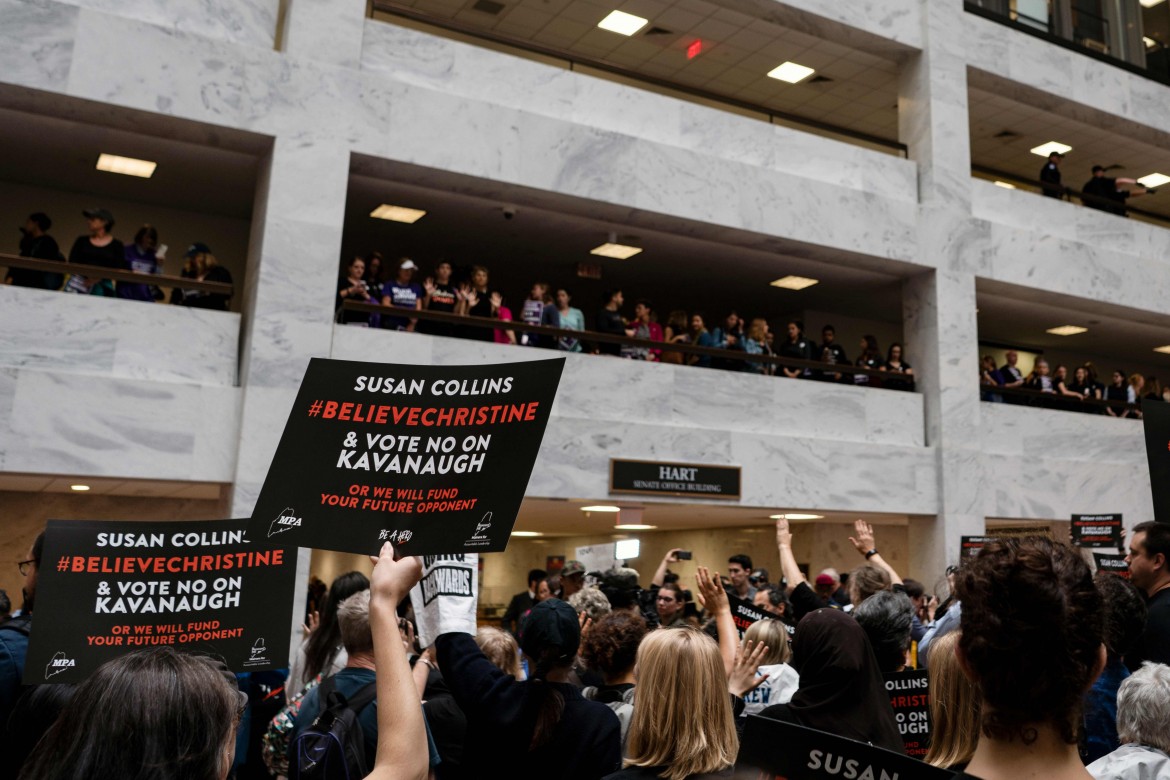Analysis
Republicans advance Kavanaugh toward high court despite credible sexual assault allegation
‘The laughter, the uproarious laughter.’ That’s what Christine Blasey Ford remembers most vividly about the time she says Supreme Court nominee Brett Kavanaugh tried to rape her at a high school party. Republicans in a Senate committee approved the judge for a floor vote.

“I am here today not because I want to be. I am terrified. I am here because I believe it is my civic duty to tell you what happened to me while Brett Kavanaugh and I were in high school.”
Thus began Dr. Christine Blasey Ford’s testimony before the US Senate Judiciary Committee. The professor of psychology at the University of Palo Alto was the first of the women who have accused Kavanaugh, a candidate being considered for the Supreme Court, of sexual assault and attempted rape.
Despite her compelling account of being forced into an empty bedroom and assaulted by Kavanaugh, the conservative federal judge was advanced along party lines toward a floor vote in the US Senate. In its role to “advise and consent” on presidential nominations to the nation’s highest court, the Republican-controlled committee listened to both sides but refused to allow the FBI to re-open a background check in light of the new accusation.
The hearing grabbed the attention of the US media, which stood ready to report every bit of news coming from the hall on Capitol Hill where the committee met to hear Ford’s testimony, followed by Kavanaugh’s.
From her first words, Ford looked like a perfectly credible witness, as she recounted, in a soft and often shaky voice, how she was assaulted 36 years ago during a party organized by upper-class teenagers. She described a scene that could be imagined all-too-easily: after having one beer, the 15-year-old Ford went to the bathroom upstairs, where the 17-year-old Kavanaugh and his friend Mark Judge, both drunk, accosted her, pushed her into a bedroom, closed the door and tried to rape her, failing only because they were too drunk and because she was wearing a one-piece swimsuit under her clothes.
She was asked multiple times about her most vivid memory of that afternoon, and Ford’s response was a punch to the gut: “the laughter, the uproarious laughter between the two [men], and their having fun at my expense.” She talked about her shame, about her fear of telling her parents that she had been in a stranger’s house drinking beer with boys without any adults around, about her desire to forget and then her remorse which re-emerged in the form of anxiety, claustrophobia and difficulty in trusting men, the causes of which she finally put into words in 2012 during a couples’ therapy session and then worked on in one-on-one therapy.
The story Ford told was, sadly, a familiar one, yet another fruit of the “boys will be boys” culture that was widely accepted in the ‘80s, but much less so now, in the #MeToo era. “This is not a trial of Dr. Ford, it is a job interview for Judge Kavanaugh,” said Democratic Senator Dianne Feinstein at the beginning of the hearing, reminding the senators why they were there: to decide whether or not to appoint Kavanaugh to the highest court of the US, a role that is held for life.
The Republicans on the committee, all of them men, understood that it would be counterproductive in terms of optics to have a female victim of sexual violence be interrogated by men, and called up a Republican prosecutor from Arizona, Rachel Mitchell, who, try as she might, found it very difficult to discredit a witness that seemed unassailable, who didn’t hide her weakness, pain and humiliation. Ford had started trying to bring her story to public attention when Kavanaugh’s name was just one of five on Trump’s shortlist, and her decision upended her life and that of her family.
While the Democratic senators requested that the only eyewitness to the violent episode, Mark Judge, be made to testify, the Republicans in the majority refused, and also rejected the possibility of a non-partisan FBI investigation. Kavanaugh, in his own statement, in which he struck an angry and defiant tone, suggested that Dr. Ford might have been attacked, but not by him, and that she must be confusing him with someone else—a possibility she categorically denied.
As the hearing continued, three Republican governors joined the call to postpone Kavanaugh’s confirmation hearings in order to conduct a full investigation, and news outlets reported there was a fourth woman who said she had experienced violence at the hands of Kavanaugh and Judge, his drinking buddy.
On Wednesday, Trump, during a surreal press conference he held at the UN, doubled down on his support for Kavanaugh: after all, he said, women often invent lots of things—like harassment and rapes—for fame and money. Trump reaffirmed his support on Twitter after Kavanaugh’s testimony.
But Trump’s rhetoric was belied by the polite and cultured image of Ford. The moderate Republican female senators Lisa Murkowski and Susan Collins, who hold crucial swing votes, have issued statements that appeared to leave open the possibility of them voting against Kavanaugh’s Supreme Court appointment, as a large protest march is being organized at the headquarters of Congress on Capitol Hill.
During the committee hearing, Democrats repeatedly called for an FBI investigation to examine the evidence and the witnesses. Republicans rejected the idea, saying there was nothing the FBI could discover that the committee could not—all the while refusing to invite other witnesses to testify before their panel.
Then, at the last minute, Senator Jeff Flake, an avowed anti-Trump Republican from Arizona, said he would not cast a final vote in favor of Kavanaugh until the FBI was allowed to investigate Ford’s allegation. It left a small window open for those interested in the truth.
Additional reporting by Ben Wolford and Eugen Russo.
Originally published at https://ilmanifesto.it/kavanaugh-in-senato-le-donne-in-piazza-contro/ on 2018-09-28
